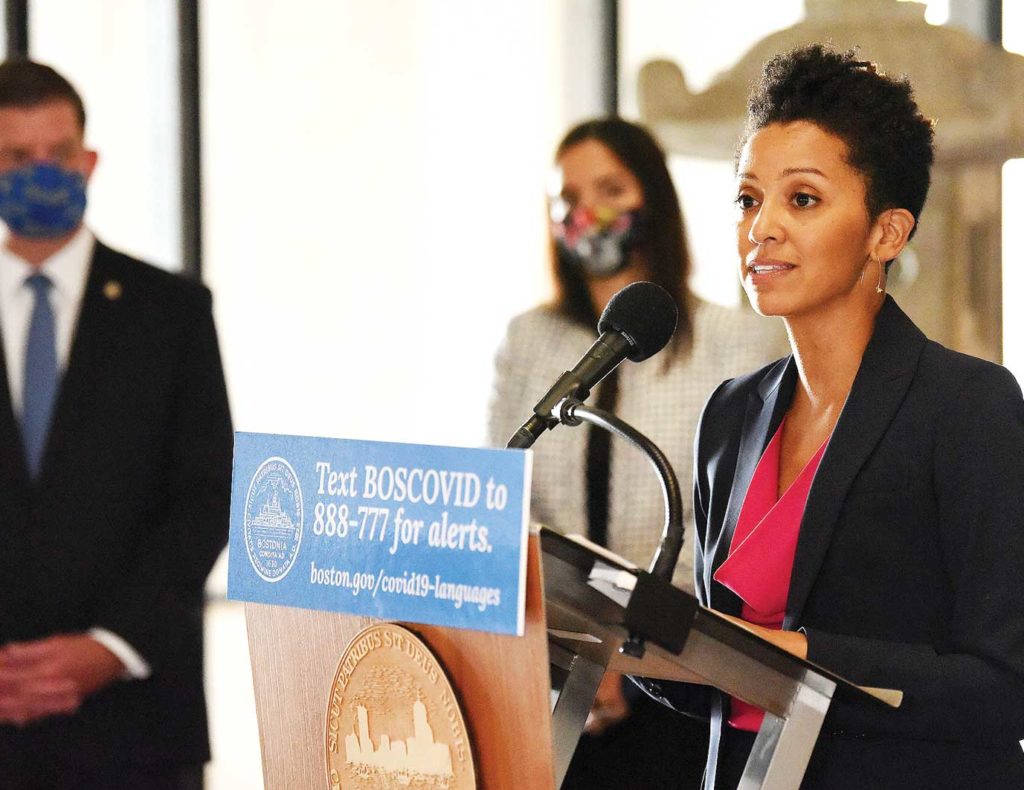Boston’s chief of equity holds conversation on closing Boston’s wealth gap

In one of her first events as the city’s chief of equity, Karilyn Crockett led a discussion Aug. 27 on the wealth gap with the Boston Women’s Workforce Council (BWWC) and the Mayor’s Office of Women’s Advancement, examining pay equity along race and gender lines.
Crystal Haynes, a reporter at Boston 25 News, moderated the conversation, which started with an opening statement from Crockett.
“When we think about what the numbers are telling us, particularly for all women and women of color, the disparities that we’re seeing in terms of pay equity are astonishing, unethical and just not right,” she said.
Prabal Chakrabarti, executive vice president at the Federal Reserve Bank of Boston, presented statistics on those disparities, highlighting that the wealth gap between white people and people of color in Boston is about $200,000. Though the gap narrows when looking at people of color with a higher education level, he said the lack of opportunities for home ownership and jobs lingers.
“Yes, college degrees lower the disparity, but not by enough,” said Chakrabarti.
According to a previous study by the Federal Reserve Bank, African Americans at the highest income level are denied home loans more frequently than white families in the 40th percentile of income.
“That just shows you can earn more than double that of a white family and still have a higher denial rate,” he said.
These “sobering” statistics, Chakrabarti says, sparked change in the private and nonprofit sectors. National Grid, for example, is examining their HR policies and retention to set new targets for diversity and equity.
Raquel Webster is an attorney at National Grid and spoke on the panel about the company’s solutions.
“One of the things you can do as a company … is to analyze where you are, because you can’t really take action if you don’t know what the data is saying about your organization,” Webster said. National Grid has hired an external organization to give an honest review of the company’s equity and diversity, and National Grid will take actions based on the data.
“National Grid has set aggressive targets for leadership,” she said. “They have business partners in HR who will work with them to achieve the targets and measure success. So that piece is accountability, which is critical.”
To fight pay inequity on a larger scale in Boston, the BWWC instituted the Boston 100% Talent Compact, and 230 companies have signed on so far. Compact signers commit to having their anonymous wage data shared with the city, and they participate in quarterly briefings to review the data and make changes that prioritize equity.
“When we take a look at the wage gap, which we do every couple of years for these 230 companies anonymously, It’s going to be affected by both by what kinds of jobs people have and how they’re paid in those jobs,” said Cathy Minehan, co-chair of the BWWC.
The panelists also discussed the possibility of reparations for women and people of color, and they examined other cities that are considering direct payouts to residents or other programs that appropriate revenue to the community.
“It seems like a bolder invitation to for us to think, what are all the tools we can deploy to really give families a leg up that they need, because they’ve been held back,” Crockett said.
She also brought up Boston Saves, Mayor Walsh’s program that helps parents of BPS students save money for college. The program became part of a larger conversation about “baby bonds” and other preventive measures for children in low-income families.
“I think sometimes when people think about ‘reparations’ or hear the term, folks blank out,” Crockett said. She suggested the panel consider ways to acknowledge the truth, that the U.S. has “received this free benefit of unpaid labor of a formerly enslaved African people, so how do we account for that debt?”
The BWWC’s goal is to have every company sign the 100% Talent Compact, so that they can have a more complete view of inequities in Boston.






